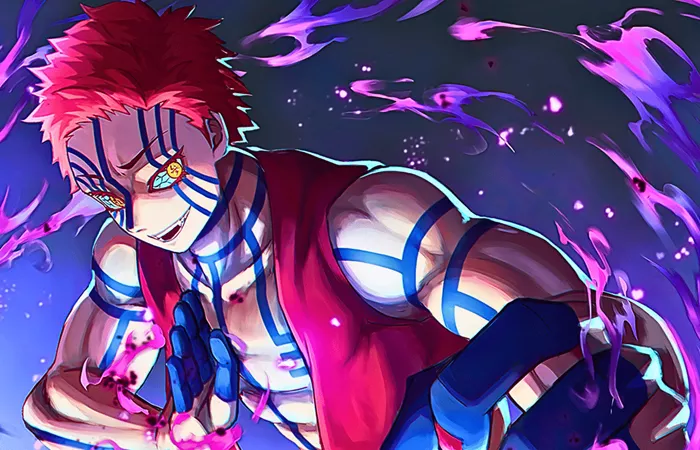Akaza, one of the most formidable antagonists in the popular manga and anime series “Demon Slayer: Kimetsu no Yaiba,” is a character that evokes both fear and admiration. Known for his immense strength, unwavering loyalty to Muzan Kibutsuji, and complex backstory, Akaza stands as one of the most memorable demons in the series. This article delves into who killed Akaza, the characters involved, and the significant themes and implications of his demise.
Akaza: The Upper Moon Three
Akaza’s Background
Before becoming a demon, Akaza was known as Hakuji, a martial artist with a tragic past. He turned to a life of crime to support his sick father and later fell in love with a girl named Koyuki. Their peaceful life was shattered when Hakuji’s loved ones were poisoned, leading him down a path of rage and despair. Muzan Kibutsuji took advantage of this vulnerability, turning Hakuji into the demon Akaza.
Strength and Abilities
As Upper Moon Three, Akaza is exceptionally powerful. His Blood Demon Art allows him to create destructive shockwaves, and his combat skills are unparalleled. He can regenerate quickly and has a high resistance to decapitation, making him a nearly invincible opponent.
Philosophy and Motivations
Akaza’s philosophy revolves around the pursuit of strength and the disdain for the weak. His belief in survival of the fittest drives him to seek out strong opponents, hoping to find a worthy adversary who can defeat him and bring meaning to his existence.
The Battle Against Akaza
The Setting: Infinity Castle
The final battle against Akaza takes place in the Infinity Castle, a labyrinthine structure created by Muzan Kibutsuji. This castle serves as the final battleground for many of the series’ climactic confrontations.
Key Characters Involved
The battle against Akaza involves some of the most prominent characters in “Demon Slayer”:
Tanjiro Kamado: The protagonist of the series, a kind-hearted demon slayer with a strong sense of justice and an unyielding will.
Giyu Tomioka: The Water Hashira, known for his calm demeanor and powerful water-based techniques.
The Intensity of the Battle
The battle against Akaza is one of the most intense and emotionally charged fights in the series. Both Tanjiro and Giyu face immense challenges as they struggle against Akaza’s overwhelming strength and regenerative abilities. The fight showcases the culmination of their training, determination, and the bonds they have formed with their fallen comrades.
Tanjiro’s Role in Akaza’s Defeat
Tanjiro’s Determination
Tanjiro’s determination and unyielding spirit play a crucial role in the battle against Akaza. Despite being outmatched in terms of raw power, Tanjiro’s strategic thinking and adaptability allow him to exploit Akaza’s weaknesses.
Utilizing Sun Breathing Techniques
During the battle, Tanjiro utilizes the Sun Breathing techniques, which are among the most powerful in the series. These techniques, inherited from his father, give Tanjiro the edge needed to confront Akaza effectively.
Empathy and Understanding
One of Tanjiro’s defining traits is his empathy and ability to understand his enemies’ pain. This empathy extends even to Akaza, allowing Tanjiro to connect with the demon on a deeper level and recognize the humanity that still exists within him.
Giyu Tomioka’s Contribution
Water Breathing Mastery
Giyu Tomioka’s mastery of Water Breathing techniques complements Tanjiro’s abilities perfectly. His calm and precise attacks help to create openings and opportunities for Tanjiro to strike.
See Also: Who Made Tanjiro’s Sword?
Unwavering Resolve
Giyu’s resolve to protect humanity and honor the memory of his fallen comrades drives him to fight with unwavering determination. His partnership with Tanjiro during the battle highlights the strength of their bond and their mutual respect.
Coordination and Teamwork
The battle against Akaza showcases the importance of coordination and teamwork. Tanjiro and Giyu’s synchronized attacks and strategic planning are crucial in overcoming Akaza’s formidable defenses and regenerative capabilities.
Akaza’s Inner Struggle
Memories of Humanity
During the battle, Akaza begins to regain memories of his past life as Hakuji. These memories of his loved ones and the pain he endured as a human resurface, creating an inner conflict within him.
The Desire for Death
Akaza’s desire for death and release from his existence as a demon becomes evident. His yearning to find a worthy opponent who can end his suffering adds a tragic dimension to his character.
Akaza’s Final Moments
In his final moments, Akaza’s inner conflict reaches its peak. The memories of his past, combined with the realization of Tanjiro and Giyu’s strength, lead him to accept his fate. Akaza chooses to stop regenerating and allows himself to be defeated, finding peace in death.
Thematic Implications of Akaza’s Death
Redemption and Humanity
Akaza’s death highlights the theme of redemption and the enduring humanity within even the most fearsome demons. His acceptance of death and the return of his human memories underscore the potential for redemption and the enduring power of love and compassion.
The Cost of Strength
The battle against Akaza emphasizes the cost of strength and the sacrifices made by the characters. Tanjiro and Giyu’s victory comes at a great personal cost, reflecting the series’ broader themes of sacrifice, resilience, and the pursuit of justice.
The Legacy of Fallen Comrades
Akaza’s death also serves as a tribute to the fallen comrades who inspired and supported Tanjiro and Giyu. The memory of these characters and their sacrifices provides the strength and motivation needed to overcome such a formidable adversary.
Conclusion
The death of Akaza is a pivotal moment in “Demon Slayer: Kimetsu no Yaiba,” representing the culmination of intense battles, personal growth, and the unyielding spirit of the series’ protagonists. Through the combined efforts of Tanjiro Kamado and Giyu Tomioka, Akaza’s formidable strength is finally overcome. The battle showcases not only the physical and strategic prowess of the characters but also the deeper themes of redemption, humanity, and the enduring power of empathy and compassion. Akaza’s death serves as a poignant reminder of the complexity of the series’ characters and the profound emotional resonance that “Demon Slayer” continues to evoke in its audience.

